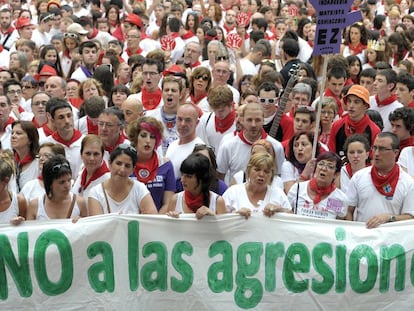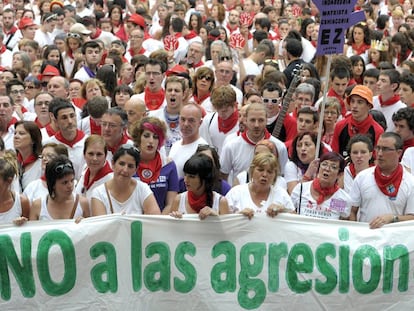Spanish fiestas start to act against sexist violence
Festivals introduce measures to prevent abuse following several cases at last year’s Sanfermines


Something is changing at Spain’s local fiestas. “We want women to attend without fear. It is the potential assailants who should be afraid. We don’t want them [the women] to worry about those pigs,” says Rafael Pérez, the councilor from Buñol (Valencia) in charge of the tomato-throwing festival known as La Tomatina, which took place on Wednesday.
In order to watch over an event that attracted 22,000 people to this small Mediterranean town, local authorities trained 350 volunteers to take action in the event of a risk situation. There were an additional 12 undercover security agents patrolling the festival area.
Acting macho must not be a source of pride, but rather a source of embarrassment
Gerardo Meil, sociology professor
It was a sign of the times. Whether spurred by women’s groups or encouraged by local governments, organizers of fiestas across Spain are making an effort to prevent cases of sexual abuse.
Alarms went off during the 2016 Running of the Bulls in Pamplona, where 15 people were arrested for sexual assault. Of these, five suspects were held for gang raping a 19-year-old woman; the attack was videotaped.
This year, Pamplona authorities introduced a raft of measures to prevent new assaults, including a city map showing the hot spots where women may feel less safe during the Sanfermines.
But Pamplona was not the only city to react. This year, authorities in the northern city of San Sebastián handed out 20,000 brochures with tips on how to prevent and combat sexual assault during the Basque resort’s main summer festival, the Semana Grande.
In Málaga, local police officers and Civil Protection volunteers have been trained to act against abuse, and the city recently rolled out radio awareness campaigns, street posters, a telephone hotline and an email address so that people could report cases.
Bilbao, Huesca, Vitoria and Zaragoza, among other cities, have taken similar steps.
Social action
Gerardo Meil, a sociology professor at Autonomous University of Madrid and author of the 2013 study Social Perceptions of Gender Violence, says that “fiestas are nothing more than an extension of normal nighttime leisure. Alcohol does not justify the acts; rather, it breaks down the inhibitions of cultural barriers.”
Meil says that beyond putting out brochures “that often never get read” and staging media awareness campaigns, it is society itself that needs to react.
There are situations that are not normal, yet because of our high tolerance for abuse, we do nothing
Munia Braña Fuentes, Federation of Young Women
“The assailant’s closest circle must condemn his actions. Acting macho must not be a source of pride, but rather a source of embarrassment.”
Spanish society has already produced many associations and neighborhood groups that are working to prevent abuse. The Federation of Young Women has been working towards gender equality since 1986. Munia Braña Fuentes, its vice president, welcomes the recent initiatives but notes that they are too focused on the summer season, when most fiestas take place.
“It’s true that a lot of outsiders show up and reinforcements are required at these times, but it’s important for cases to attract attention all year round,” she says.
Experts also underscore that often, only the most serious cases such as rape or murder get viewed as sexist violence. “There are situations that are not normal, yet because of our high tolerance for abuse, we do nothing. Sexist violence includes fondling, flirtatious remarks on the street, social roles that are denigrating to women...any situation that makes a woman uncomfortable is reason enough to file a complaint,” says Braña Fuentes.
In July, the singer for British metalcore band Architects, Sam Carter, stopped a concert at the Lowlands festival in Biddinghuizen, in The Netherlands, after witnessing a man grab a woman’s breasts. “I saw a girl, a woman, crowdsurfing over here, and I’m not going to fucking point the piece of shit out who did it, but I saw you fucking grab at her boob, it is fucking disgusting and there is no place for that shit,” he yelled out.
He was not the first singer to stop a show for similar reasons. The Spaniard Alejandro Sanz went even further while on a Mexican stage. In fact, he came down and faced the aggressor. His security team them expelled the man to cheers from the audience. And Eddie Vedder of Pearl Jam publicly shamed an aggressor during a concert at the Wrigley Field Festival in Chicago.
Enrique Echeburúa, a professor of clinical psychology at the University of the Basque Country and author of the Family Violence Handbook, celebrates these acts because they come from celebrities with millions of fans. “It is also good that they are men, because the fight of women against abuse has often been the sole job of women, and it is positive that men are joining this rejection of abusive behavior.”
English version by Susana Urra.









































